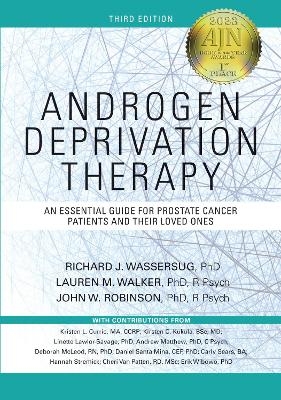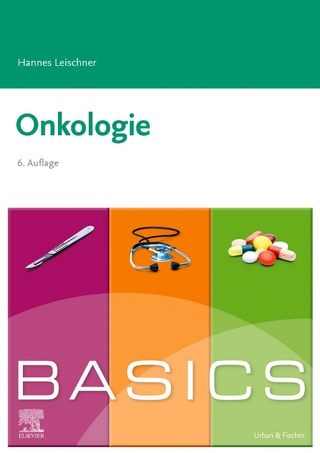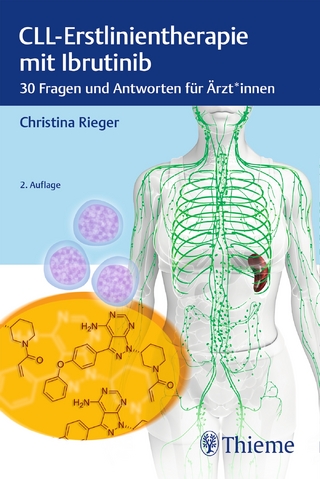
Androgen Deprivation Therapy
Springer Publishing Co Inc (Verlag)
978-0-8261-8402-3 (ISBN)
Awarded first place in the 2023 AJN Book of the Year Awards in Consumer Health.
"Androgen deprivation therapy is the main treatment for locally advanced and metastatic prostate cancer. It is a very effective treatment, but it has major impact on many aspects of men's health. Thousands of articles have been dedicated to that subject. This book distills these down and provides a comprehensive understanding and path forward for the many challenges associated with androgen deprivation therapy."
- David Crawford, M.D., Professor of Urology, University of California San Diego
"As someone who has treated men with prostate cancer for over 25 years, I recognize the burden of care of the patients and their loved ones. This book provides excellent tips on how to deal with the disease. I have used prior versions for many years in my practice and wholly endorse this new version. It’s a must read!"
- Neil Fleshner, MD, Chair of Urology, University of Toronto Ontario, and Love Chair in Prostate Cancer Prevention, Princess Margaret Cancer Centre, Toronto, Ontario
Androgen Deprivation Therapy is the only guide written exclusively about the side effects of hormone therapy. The authors have collaborated with the European Association of Urology to produce this specially revised new edition to serve men affected by ADT across the globe. This comprehensive workbook for prostate cancer patients and their loved ones is filled with practical advice from experts in the field. The book covers a wealth of strategies to help men cope with ADT and maintain a good quality of life while on this treatment. It is not only an informational manual, but a guide for both patients and partners about ways to make changes in their lives that can keep them healthy and positive when the patient is on ADT.
New to this Edition:
Updates on the primary drugs used to treat prostate cancer with tables for common brand names worldwide.
Updates on the physical side effects of ADT, such as hot flashes, weight gain, muscle loss and fatigue—plus management strategies.
Expanded information on exercise and nutrition for men diagnosed with prostate cancer.
Expanded information on the psychological and relational impact of ADT on both patients and their partners, with strategies to maintain intimacy despite reduced libido and difficulties with erections.
Expanded discussion on dealing with emotional side effects, such as mood swings and depression.
Exercises, activities, worksheets, and other tools to promote discussion and inspire behavioral changes that can reduce the burden of ADT.
Officially endorsed by the European Association of Urology and the Canadian Urological Association.
Richard J. Wassersug, PhD, is a research scientist who earned his doctoral degree in evolutionary biology from the University of Chicago in Illinois. He then spent most of his career studying the biology of amphibians and teaching anatomy in the medical school at Dalhousie University in Halifax, Nova Scotia. At the age of 52 years, he was diagnosed with prostate cancer and has received multiple treatments for the disease. After beginning androgen deprivation therapy, he redirected his research to study the psychology of androgen deprivation in various populations. Wassersug now holds the title of Honorary Professor at the University of British Columbia, Vancouver, Canada. Lauren M. Walker, PhD, R Psych, is an Adjunct Associate Professor in the Department of Oncology's Division of Psychosocial Oncology and the Department of Psychology at the University of Calgary in Alberta. She is a registered clinical psychologist in the province of Alberta and operates a private clinical psychology practice for individuals with sexual concerns (see www.drlaurenwalker.com). She completed a clinical fellowship in 2015 specializing in oncology and sexuality, where she focused on developing programs to help cancer patients adapt to sexual changes after cancer treatment. She received her doctorate in clinical psychology in 2013 from the University of Calgary. There she completed her dissertation, which evaluated a patient education initiative for prostate cancer patients (and their partners) starting androgen deprivation therapy. Walker established the University of Calgary's Oncology Sexual Health Lab and maintains an active research program. She also maintains an Instagram account aimed to decrease stigma and to disseminate scientific and clinical knowledge about sexuality (www.instagram. com/drlaurenwalker). John W. Robinson, PhD, R Psych, was a clinical psychologist and member of the Genitourinary and Gynaecological Cancer Programs at the Tom Baker Cancer Centre in Calgary, Alberta, from 1986 until he retired in 2019. Robinson's career focused on providing clinical services and creating and evaluating new ways to ease the psychological burden of cancer on not just patients but also their loved ones. He continues to hold an adjunct associate professorship in the Departments of Oncology (Division of Psychosocial Oncology) and Psychology at the University of Calgary, where he continues to be involved in research.
Foreword, Hendrik Van Poppel
Foreword, Paul F. Schellhammer, MD, FACS
Preface
Introduction
Before You Begin
Will Reading This Book Make Me More or Less Anxious?
I Have Never Read a Manual Before—Why Start Now?
How to Read This Book
What Are Your Values?
Where to Go for Further Information
Moving Forward: Questions for Discussion
PART ONE: ANDROGEN DEPRIVATION THERAPY
What Is Androgen Deprivation Therapy?
How Does Androgen Deprivation Therapy Work?
Abiraterone and Androgen Annihilation
Androgen Receptor-Targeted Agents and Hormonal Intensification
A More In-Depth Look at Luteinizing Hormone-Releasing Hormone Agonists Versus Antagonists
Yet Other Forms of Androgen Deprivation Therapy
The Original Androgen Deprivation Therapy
The Future of Androgen Deprivation Therapy
What Medications Are You Taking for Androgen Deprivation Therapy?
How Long Will I Be on Androgen Deprivation Therapy?
What Is the Prostate-Specific Antigen Test?
How Is the Prostate-Specific Antigen Test Used for Men Who Have Been Treated for Prostate Cancer?
How Is the Prostate-Specific Antigen Test Used When You Are on Androgen Deprivation Therapy?
How Good Is the Prostate-Specific Antigen Test?
How Long Will Androgen Deprivation Therapy Control My Cancer?
Moving Forward: Questions for Discussion
PART TWO: PHYSICAL SIDE EFFECTS
Hot Flashes
Medications
A Device That May Help With Hot Flashes
Counseling
Activity: Abdominal Breathing/Paced Respiration
Activity: Hot Flash Diary
Weaker Bones
Weight Gain and Muscle Loss
Diabetes
Metabolic Syndrome and Cardiovascular Risk
Anemia and Fatigue
Breast Growth and Discomfort
Genital Shrinkage
Loss of Body Hair
Other Possible Side Effects
Activity: Pros/Cons Table
Activity: Action Plan
Action Plan Example: Practice Abdominal Breathing to Help With Hot Flashes
Activity: Goal Setting and Confidence
Activity: Side Effects Self-Assessment
Physical Side Effects: Essentials
Moving Forward: Questions for Discussion
PART THREE: EXERCISE
Exercising Safely
Caution
Warm-Up Exercises
Aerobic Exercises
Resistance Training
Keeping Your Bones Healthy
Yoga and Tai Chi
Cool Down
Making the Decision to Exercise
Habit and Reason
Activity: Pros/Cons Table
Setting Goals That Are SMART for You
Example SMART Goals
What Are Your SMART Goals?
Activity: Matching Meaning and Change Using Self-Statements
Meaning Self-Statements
Preparing to Successfully Begin Exercising
Your Action Plan
When Do You Plan to Do It
Where Do You Plan to Do It
Who Might You Do It With
Activity: Action Plan
Action Plan Example: Start Walking Routinely
Activity: Goal Setting and Confidence
Maintaining Your Motivation
Managing Lapses and Relapses
Reward Yourself
Support
Activity: Identifying and Overcoming Barriers to Starting and Maintaining an Exercise Program
Exercise: Essentials
Moving Forward: Questions for Discussion
PART FOUR: HEALTHY EATING
Reading Food Labels
Fats
Protein
Carbohydrates
Determining Your Current Body Mass Index
Estimating Your Nutritional Needs
Omega-3 Fatty Acids
Omega-6 Fatty Acids
Soy
Vitamin D
How Do I Get Enough Vitamin D?
Calcium
Calcium in Your Diet
Phytonutrients
Polyphenols
Punicalagin and Ellagic Acid
Lycopene
Activity: Pros/Cons Table
Activity: Action Plan
Action Plan Example: Eat Healthier Snacks
Activity: Goal Setting and Confidence
Healthy Eating: Essentials
Moving Forward: Questions for Discussion
PART FIVE: EFFECTS ON PSYCHOLOGICAL WELL-BEING
Emotional Distress
Emotional Expression
Activity: Self-Assessment—Screening for Emotional Distress
Depression
Anxiety
Activity: Progressive Muscle Relaxation
Activity: Mindfulness Meditation
Instructions
Fatigue
Grief
Cognition
Activity: Pros/Cons Table
Activity: Action Plan
Action Plan Example: Work on Stress Management
Action Plan
Activity: Goal Setting and Confidence
Effects on Psychological Well-Being: Essentials
Moving Forward: Questions for Discussion
Emotional Changes
Cognitive Changes
PART SIX: EFFECTS ON INTIMATE RELATIONSHIPS AND SEXUALITY
Androgen Deprivation Therapy Lowers Sexual Desire
How the Loss of Sexual Desire Affects Couples
Staying Close in Nonsexual Ways
Making Time for Intimacy
Dating
Being Open and Honest
Maintaining a Sexual Relationship
Suggestions for Enjoying Sensual Pleasure With Low Sexual Desire
Be Flexible About Who Initiates Intimacy
Redefine Your Sexual Activities
Take the Focus Off Orgasm
Be Aware of Decreased Responsiveness to Sexual Touch
Enhancing Awareness of Sensation With Mindfulness
Stimulate Your Sexual Appetite
Orgasms Without Ejaculation
Sex: Beyond Intercourse
Suggestions for Pleasing Your Female Partner
Suggestions for Pleasing Your Male Partner
Using Sexual Aids and Sex Toys
Sexual Devices to Permit Insertive Sex Without Erections
Treatments for Erectile Dysfunction
General Comments on Using Erectile Assistive Aids
Oral Medications
Injections
Intraurethral Suppositories
Vacuum Pump
Inflatable Penile Prosthesis
Solo Masturbation
The Use of Lubricants for Men
Developing New Sexual Practices
Activity: Beliefs Awareness
Activity: Pros/Cons Table
Activity: Action Plan
Action Plan Example: Increasing Physical Affection With My Partner
Action Plan Example: Getting Out More
Activity: Goal Setting and Confidence
Effects on Intimate Relationships and Sexuality: Essentials
Moving Forward: Questions for Discussion
Questions for Single Men
Questions for Couples
PART SEVEN: IMPACT ON COMMITTED RELATIONSHIPS
Potential Changes in the Relationship
Changes in the Way You Interact With Each Other
Differences in Coping Style
Increased Self-Doubt
One Thing to Avoid
Activity: Pros/Cons Table
Activity: Action Plan
Action Plan Example: Communicate More Effectively With My Partner
Activity: Goal Setting and Confidence
Impact on Committed Relationships: Essentials
Moving Forward: Questions for Discussion
PART EIGHT: UNIQUE CONSIDERATIONS FOR GAY RELATIONSHIPS
Androgen Deprivation Therapy May Impact Committed Relationships for Gay Men
Activity: Pros/Cons Table
Activity: Action Plan
Action Plan Example: Communicate More Effectively With My Partner
Activity: Goal Setting and Confidence
Unique Considerations for Gay Relationships: Essentials
Moving Forward: Questions for Discussion
PART NINE: CONCLUSION: STAYING HEALTHY
Appendix
Drug Chart
Prostate-Specific Antigen (PSA) Chart
Hot Flash Diary
Pros/Cons Table
Action Plan
Goal Setting and Confidence
Side Effects Self-Assessment
Screening for Emotional Distress Mood Questionnaire, Symptoms of Distress Questionnaire
Beliefs Awareness Exercise
Glossary
Resources
Bibliography
Acknowledgements
Index
Contributors
About the Authors
| Erscheinungsdatum | 29.03.2023 |
|---|---|
| Verlagsort | New York |
| Sprache | englisch |
| Maße | 178 x 254 mm |
| Gewicht | 494 g |
| Themenwelt | Sachbuch/Ratgeber ► Gesundheit / Leben / Psychologie |
| Medizin / Pharmazie ► Medizinische Fachgebiete ► Onkologie | |
| ISBN-10 | 0-8261-8402-2 / 0826184022 |
| ISBN-13 | 978-0-8261-8402-3 / 9780826184023 |
| Zustand | Neuware |
| Informationen gemäß Produktsicherheitsverordnung (GPSR) | |
| Haben Sie eine Frage zum Produkt? |
aus dem Bereich


